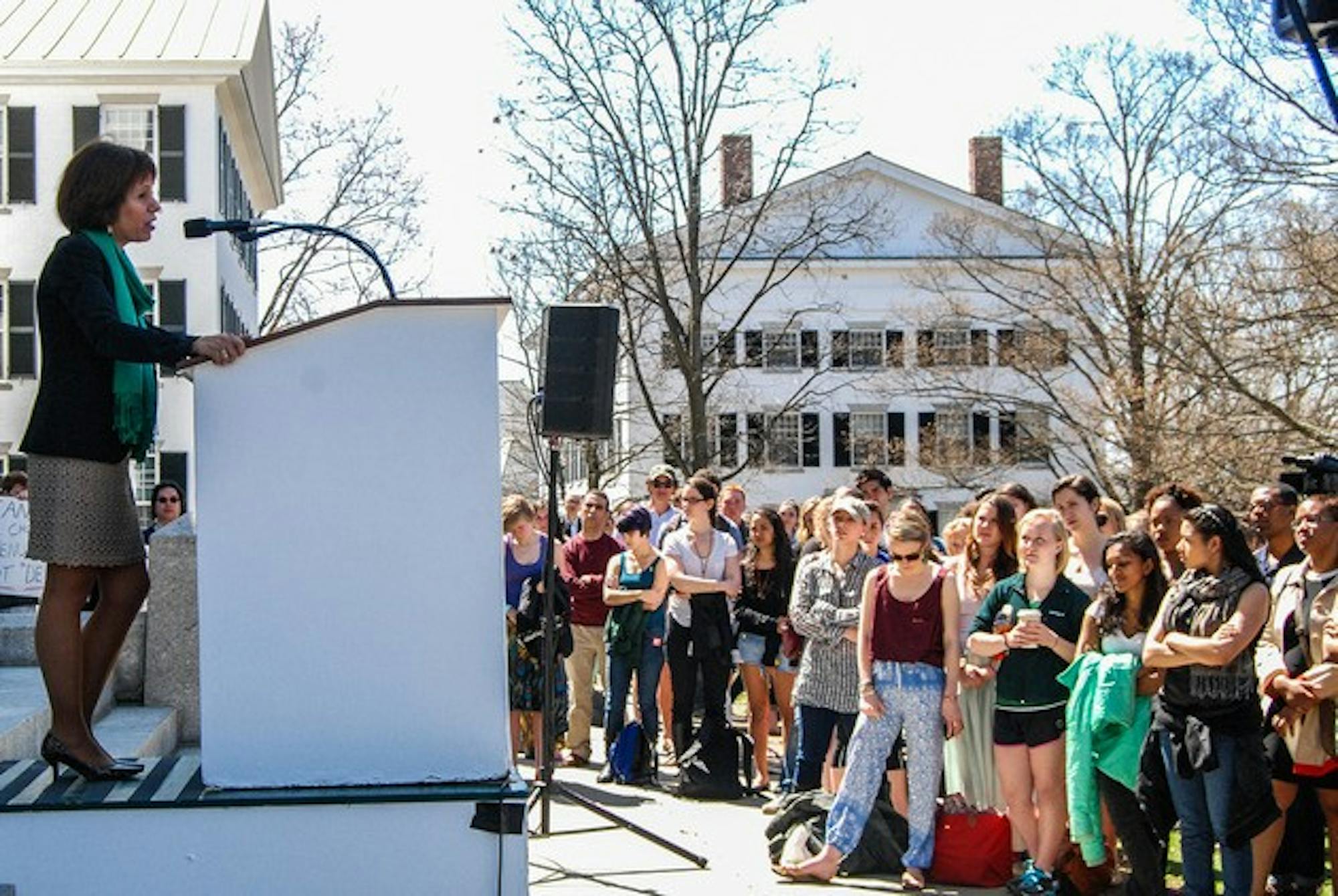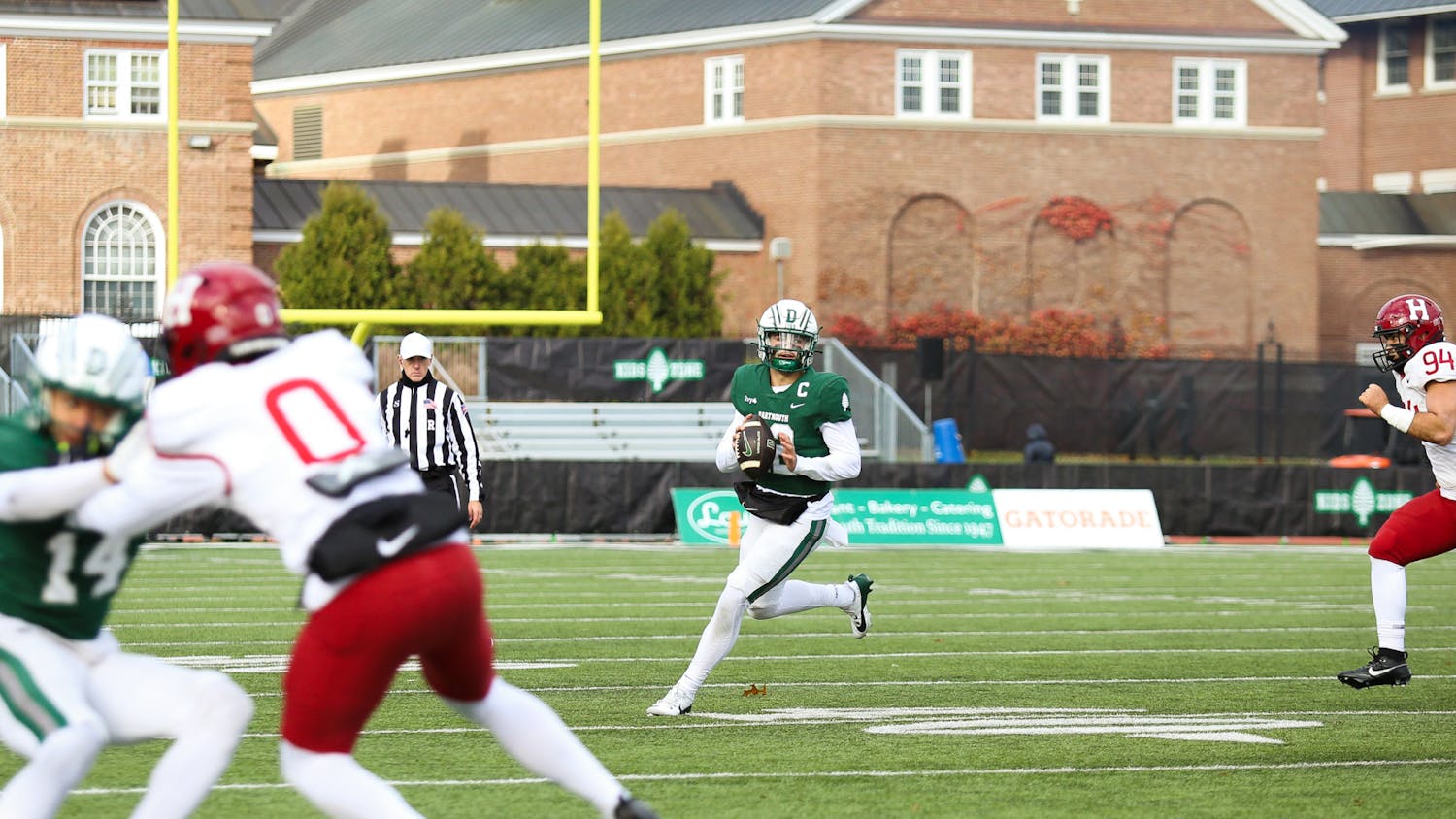Administration and faculty
In November, the College announced that Philip Hanlon would become Dartmouth's 18th president. A member of the Class of 1977 and a mathematics major, Hanlon has spent his career in academia, teaching advanced mathematics at the University of Michigan and serving as the school's provost and executive vice president for academic affairs.
Hanlon assumed the College presidency in June and has hosted dinners for students at his house, reached out to faculty and administrators and attended campus events this summer.
Senior administrators who departed from the College this year include interim president and former Provost Carol Folt, now chancellor at the University of North Carolina at Chapel Hill, and senior vice president and senior advisor to the president David Spalding, now dean of Iowa State University's College of Business.
Dartmouth has two ongoing search committees to fill the positions of provost and senior vice president of marketing. In July, the College announced the appointment of Richard Mills, previously executive dean for administration at Harvard Medical School, to take on the role of chief financial officer and executive vice president, a position vacated by Steven Kadish in 2012. The College has not announced plans to fill Spalding's positions.
A number of high profile professors departed from the College at the end of the academic year, including former College President and history professor James Wright, psychology professor George Wolford, math professor Martin Arkowitz and African-American studies and history professor Russell Rickford.
Campus roiled in the spring
A dozen students from Real Talk Dartmouth protested a welcome show for members of the Class of 2017 during Dimensions weekend in April. The group interrupted the show, chanting "Dartmouth has a problem" and critizing the prevalence of sexual assault, racism and homophobia on campus before a crowd of several hundred prospective students.
While some students complained about the protesters' choice of venue and targeted audience, a small group posted violent threats on Bored at Baker, an anonymous chat room for Dartmouth students, raising concerns about the students' safety.
The weeks following the protests spurred campus reflection and a greater sympathy for the protesters' message. The administration canceled classes on April 24, five days after the protests, for a day of speeches and dialogue groups about campus climate issues. Clubs and affinity groups continued to discuss issues of sexual assault and campus inclusivity at events throughout the term.
In May, students and alumni filed a Clery Act complaint against the College that alleged underreporting of campus crimes such as sexual assault, discrimination, bullying and hazing. The complaint, sent to the Department of Education for review, included testimonies from over 30 students and alumni. The Department of Education has not said whether it will take up the case.
Later that month, a member of the Class of 2016 was arrested and subsequently indicted on seven counts of aggravated sexual assault by the Grafton County Superior Court. Another student was arrested later that month for stealing a watch from a fraternity house bedroom.
On the last day of spring term, the College announced that it would take disciplinary action against the Dimensions show protesters. The College alleged that the protesters had failed to comply with instructions from event officials, a breach of Standard IX of the Dartmouth College Community Standards of Conduct.
A tragic drowning occurred at a celebratory event for graduating seniors, just days before Commencement. The victim was the younger brother of a member of the Class of 2013 who failed to surface after jumping off of a rope swing into the Connecticut River.
Trends and policy changes
This year, Dartmouth saw a 12.5 percent decrease in early decision applications and a 3 percent decline in regular decision applications. In total, 1,093 out of 2,252 accepted students, including 464 students admitted through early decision, enrolled.
Dartmouth's total yield rate fell by 1 percent to 48.5 percent. Some attributed the decline to negative publicity about Dartmouth's Greek life during the year, while others pointed to students' preference for non-binding early action at Yale University and Harvard University.
Dartmouth instituted new alcohol and hazing policies last September, which included allowing random walkthroughs of Greek houses by Safety and Security officers and requiring undergraduate advisors to report residents exhibiting high risk behavior.
The College also expanded its Brief Alcohol Screening and Intervention for College Students program, an online education program about the risks of alcohol and drug use, and increased its bystander education programs.
GLC voted to adopt uniform sanctions for members found responsible for sexual misconduct, replacing the previously ad hoc system of internal adjudication. The policy mandates sanctions such as social probation, education training, revocation of a member's ability to live in the Greek house or expulsion, depending on the violation. These sanctions are in addition to action taken by the Committee on Standards.
The Greek Leadership Council, its five subcouncils and Greek house presidents voted in May to prohibit freshmen from attending Greek events that serve alcohol until after Homecoming weekend.
The policy change, which will go into effect this fall, is intended to prevent high risk behavior among first-year students and protect Greek organizations, and freshmen caught violating the policy will be prohibited from joining a Greek house during their sophomore year.
In July, the Student and Presidential Committee on Sexual Assault issued a number of recommendations for reducing sexual violence on campus, including increasing education for potential first responders, making expulsion the expected sanction for students found to have perpetrated sexual assault, moving counselor offices to a centralized campus location and finding ways to increasereporting of sexual violence.
The Board of Trustees voted in March to raise tuition and other fees by 3.8 percent, the lowest increase in 10 years. Including room, board and mandatory fees, Dartmouth is the second most expensive Ivy League college at $60,201 a year. The College's 2013-2014 budget includes $82 million for financial aid, a 6.5 percent increase from its budgeted aid the previous year.
Approximately 45 percent of Dartmouth students receive financial aid, and the average aid award covers 66 percent of the cost of attendance, or about $40,000.ARTS, ATHLETICS AND EXTRACURRICULARS
Dartmouth celebrated the Year of the Arts, a special yearlong focus on arts programming and interdisciplinary learning. The Black Family Visual Arts Center opened for classes in September and the Hopkins Center marked its 50th anniversary in October with a special weekend of performances from alumni and students. Throughout the year, the Hop attracted performers such as cellist Yo-Yo Ma, trumpeter Wynton Marsalis and actor John Lithgow. The Hood Museum of Art focused its programming on an aboriginal Australian art exhibit, which included over 100 pieces of work from urban and rural native artists living around the continent.
The College also celebrated its 40th anniversary of coeducation, the Native American studies program and the Black Alumni of Dartmouth Association. Coeducation and the Native American studies program were both implemented under the direction of former College President John Kemeny.
Many Dartmouth athletic teams had standout years, including men's soccer, hockey and baseball and women's soccer, track and lacrosse. The baseball team was runner-up for the Ivy League championship series and won its division title.Men's soccer placed second in the Ivy League, just missing an automatic bid to the NCAA championships. Men's hockey was ranked eighth in the nation after a string of early victories and managed to advance in the ECAC tournament, but faced injuries later in its season.
Women's softball won its division before falling to the University of Pennsylvania in the Ivy League championship series. Women's lacrosse finished third in the Ivy League and received an at-large bid to the NCAA tournament, where the team advanced to the second round.
Women's track and field placed fifth at the outdoor track Heptagonal Championships. Distance runner Abbey D'Agostino '14 won three individual NCAA championships throughout the year and just missed qualifying for the World Championships in June.
In April, students elected Adrian Ferrari '14 as student body president. Ferrari ran on a platform of increasing communication and coordination between campus groups.
Students organized voter registration drives and shuttles to voting booths at Hanover High school for November's presidential election. Vice President Joe Biden and his wife, Jill Biden, spoke in front of Cutter-Shabazz in September.
Other prominent speakers who visited campus throughout the year included Princeton University professor and foreign policy advisor Anne-Marie Slaughter, social activist Cornel West, education innovator and Commencement speaker Geoffrey Canada. Comedian and author Rachel Dratch '88 and president of the Women's National Basketball Association Laurel Richie '81 also spoke on campus.




